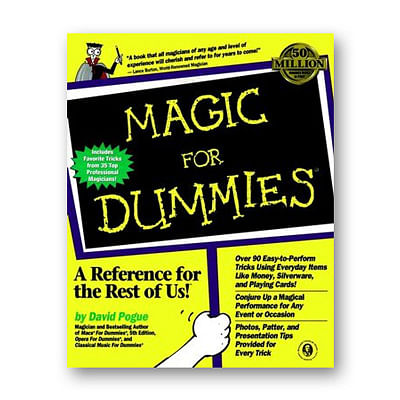Magic for Dummies by David Pogue
Reviewed by Jamy Ian Swiss (originally published in Genii January, 1999)

Since I am a contributor and advisor to this project, I would, as in the past, normally invite a guest reviewer to consider the book rather than review it myself. However, since my involvement with the book is relatively small, and because I am trying to clear a backlog of titles as Genii gets back on schedule, I hope readers will for-give the obvious conflict of interest. Actually, it may not be as obvious as one might think, since although I did con-tribute a trick (and some advice) to this book, I had very mixed feelings about doing so. I tend to be rather suspicious of books of magic for the public and in the end gritted my teeth and decided to take part after speaking with several friends who had similarly agreed to contribute, and having some conversations with the book's affable "magic consultant," Mark Levy. I was assured that the type of tricks to be revealed would be decidedly low-level on the magic sophistication and secrecy scale and as well that the author and magic consultant were sincere in their intent to provide a thoughtful and responsible guide to magic for the public. I agreed to cooperate, although I was far from optimistic about the outcome; in my worldview, magic is decidedly not for dummies. I am now delighted to report that 1 was pleasantly surprised upon reading this book. I not only thoroughly enjoyed it, but I commend the author, David Pogue, for a careful, thoughtful, and effective job. Mr. Pogue is the author of several books in the now famous "Dummies" series, including Macs for Dummies, More Macs for Dummies, Classical Music for Dummies, and Opera for Dummies. He is also an amateur magician who obviously cares a great deal for his hobby and art. I do have a handful of quibbles:
Were it up to me, I would have excluded a gratuitous reference to Zombie—a connection no readers would ever make had it not been made for them—in an otherwise perfectly acceptable description of the old rising bread roll; a rather elaborate equivoque, which I feel is inappropriate in a book of this nature (both this and the previous item were, oddly enough, contributed by S.A.M. past-President George Schindler); the ashes-in-hand contributed by a stage performer who has probably never had the experience of seeing a close-up professional like Eugene Burger perform his stunning version for a paying audience; and, okay, call me crazy, but I never like seeing the salt-shaker/glass through table in these books, no matter that they have been revealed count-less times before.
My point in these cases is simply that these are items that can be and are in fact used effectively by professionals, unlike most (albeit not all) of the remainder of the tricks described. I state these objections for sake of completeness and to avoid any potential charge of vagueness in my complaints in this department. But having gotten that unpleasantness out of the way, I must say that this book is without question the best for-the-public introduction to magic that I am familiar with. There are other such books that of course have merit (and still more that have little or none whatsoever, as have been occassionally addressed in these pages), such as The Magic Book by Harry Lorayne (reviewed in the January, 1998 Genii) and the popular Bill Tarr books. But those works seem more like companions to assist someone who has gone past the most basic materials and has already made multiple visits to the magic shop.
Magic for Dummies, on the other hand, seems the perfect book to serve as one's very first introduction to the subject, certainly for those of young adolescent age or older. What makes this book the ideal choice is that, with the few exceptions already noted, the 90-plus tricks described are extreme in their simplicity, yet, unlike in most other such works, these most basic tricks are accompanied by an ambitious and yet extremely accessible array of ancillary material. Subjects such as presentation, misdirection, history, practice, and much more are introduced hand in hand with these basic tricks. Thus the beginner needn't wait years until someone finally tells him about Our Magic or the Fitzkee Trilogy to start learning a little theory; instead he or she is introduced to these ideas, albeit in very basic form, right at the start. What's more, even the subject of credits is addressed—first in my own contribution (oddly enough!) and later in an eight-page "trickography." While this latter is not entirely accurate or complete—the "Jumping Rubber Band," as is often the case, fails to include a correct attribution to Stanley Collins, and a version of the "Rope Through Neck" relies upon, I believe, a Stewart James handling—nevertheless the effort is clearly sincere, mostly successful, and all but unprecedented in this type of work. For this alone the author is to be roundly praised. Without doubt, the next time someone asks me for a first-time book on magic, Magic for Dummies will be my choice.
